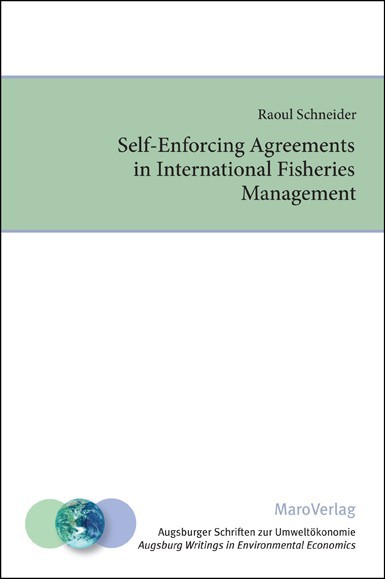
Raoul Schneider
Self-Enforcing Agreements in International Fisheries Management
Dr. Raoul Schneider studierte Physik und Wirtschaftsphysik an der Universität Ulm und der Università del Salento (Italien). Im Anschluss promovierte er im Bereich der Umweltökonomik am Institut für Wirtschaftswissenschaften der Universität Ulm. Seine Forschungsinteressen umfassen die Ökonomie internationaler Umweltabkommen, v.a. im Kontext des Klimaschutzes und des Fischereiwesens, die Bereitstellung globaler öffentlicher Güter sowie Anwendungen der Auktions- und Spieltheorie.
Die gegenwärtige Überfischung zahlreicher internationaler Fischereiressourcen stellt nicht nur ein ökologisches, sondern auch ein bedeutendes ökonomisches Problem dar, dessen Lösung nur auf der Basis freiwilliger internationaler Kooperation erfolgen kann. Dr. Raoul Schneider untersucht in »Self-Enforcing Agreements in International Fisheries Management« anhand eines bioökonomischen Modells, wie die Anreize für kooperatives Verhalten bestimmt werden durch das Migrationsverhalten der Fischbestände sowie die räumliche Aufteilung der Weltmeere in Regionen unterschiedlicher Jurisdiktion. Dabei zeigt der Autor unter anderem auf, dass weniger ambitionierte Fischereiabkommen unter Umständen vielversprechender sind, da sie von einer größeren Zahl von Mitgliedern unterstützt werden. Die Ergebnisse sind in einer globalisierten Welt von umso größerer Bedeutung, als sie in Bezug zur generellen Thematik internationaler öffentlicher Güter stehen.
Most internationally shared fish stocks suffer from severe over-exploitation – a situation that entails large ecological damages as well as huge economic losses. Due to the absence of a powerful supranational authority, any cooperative agreement to overcome these multiple »tragedies of the commons« must be voluntary, i.e. self-enforcing. In »Self-Enforcing Agreements in International Fisheries Management«, Raoul Schneider examines the stability and success of international fishery agreements based on a bioeconomic model that reflects both the spatial structure of international marine law and the migratory nature of many fish stocks. Inter alia, the author shows that less ambitious agreements might sometimes perform better because more countries are willing to participate. The results are all the more important as they relate to the general context of international public goods, an issue of growing concern in a globalized world.
Raoul Schneider
Dr. Raoul Schneider studied physics and economics at the University of Ulm and the University of Salento (Italy). Subsequently he earned his doctorate in environmental economics at the University of Ulm. His research interests include the economics of international environmental agreements, in particular with respect to climate change and fishery issues, the provision of global public goods, as well as applied auction and game theory.6 weitere Produkte





